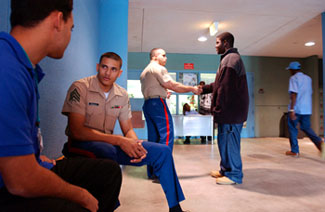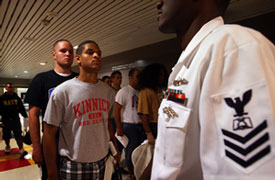ASKIAM
Senior Correspondent
58 percent drop in young Black enlistees
- Black military recruits on the decline (FCN, 07-19-2007)
- Military recruitment down: Blacks silently protest war (FCN, 04-06-2005)
- Army recruiters: No Latino left behind (FCN, 11-24-2004)
- FCN Editorial: Will you answer the call of the military? (FCN, 07-18-2004)

WASHINGTON (FinalCall.com) – In the face of a huge drop in Black recruitment, the U.S. military is waging a losing battle on the home front–for new enlistees to don the uniform. Since fiscal year 2000, Defense Department statistics show that the number of young Black enlistees has fallen by more than 58 percent.
The Army may have been hardest hit. In 2000, Pentagon statistics reveal that 42,000 Black men and women applied to join. Just five years later, that number was down to just above 17,000.
The immoral and unpopular war and occupation of Iraq is the biggest single factor depressing Black enlistment, along with distrust of President George W. Bush and Vice President Dick Cheney–neither of whom served in combat themselves–and the persistent complaint since the Vietnam War that Black soldiers are the Army’s “cannon fodder,” disproportionately assigned to combat jobs.
Since December 2001, the Honorable Minister Louis Farrakhan has been a leading voice in the principled opposition to the Iraq war, warning Pres. Bush directly, as well as young Blacks, Latinos and others, in two open letters of the consequences now unfolding in this country.
“There is a rising chorus of anti-war demonstrations in the nation and throughout the world and it will intensify as you move toward war with the thought of occupying Iraq,” Minister Farrakhan said in a letter to Pres. Bush dated October 30, 2002. “The anti-war demonstrators will blame every death of an American service person and every death of an Iraqi citizen on you, and this will produce a crisis for your administration within the United States, as well as in countries throughout the world.”
The Army Recruiting Command acknowledged that the war in Iraq has depressed respect for the military in the Black community where the war is very unpopular. A recent CBS News poll showed 83 percent of Blacks said the Iraq invasion was a mistake. In addition, Pres. Bush’s approval rating is at an all-time low with Black voters at about 9 percent, according to a 2006 Pew Research Center poll.

The Black decline is by far the largest of any demographic group. By contrast, from 2000 to 2005, White applicants declined by about 10 percent, while Hispanic applications dropped by only 7 percent.
“African-Americans have been such a key part of the modern military,” said Michael O’Hanlon, military analyst for the Brookings Institution, according to a published report. “There’s obviously been a degree where the Black community in the United States has seen [military service] as culturally valuable and promoted it. That whole culture and value system is at risk in the Black community. That is a big, big change. To me, it portends the possibility of a longer-term loss of interest. It can be tough to get it back.”
Just as frustration over the pace of the Civil Rights movement began to cool Black enthusiasm for the military during the Vietnam War era, the Bush administration’s non-response to the suffering of victims during Hurricane Katrina has also increased the notion that the government itself “does not care about Black people.”
“The VietCong never called me a n—-r,” was the refrain made popular in 1967 by Heavyweight Boxing Champion Muhammad Ali, whose celebrated claim to be a conscientious objector because of his status as a minister in the Nation of Islam was eventually decided in his favor by the U.S. Supreme Court.
The answer for Black people is to separate from this unjust society, “and create something new and better under the guidance of God,” Minister Farrakhan advised Oct. 16, 2007 in his Day of Atonement address, speaking in Atlanta. “…just think, Pharaoh has actually let us go. Pharaoh has nothing more for us to do except fight in his unjust wars or serve in his prison industrial complex,” Minister Farrakhan said.
According to an October 2007 Boston Globe article, young Blacks today confirmed their disillusionment with the war.
“Why would we go over there and help them [Iraqis], when [the U.S. government] can’t help us over here?” Nathaniel Daley, a young Black man from Atlantic City, N.J. told Boston.com recently, noting the government’s failure in 2005 at providing Hurricane Katrina relief.
The war “is unnecessary,” said his friend Brian Jackson. “It’s not our war. We got our own war here, just staying alive,” Mr. Jackson continued, pointing to the fact that his hometown of Philadelphia has seen more than 200 homicides, mostly Black men killing other Black men, so far this year.

In response, the military has lowered its standards on age, education, physical fitness, and acceptable past criminal record. The Army has also raised its enlistment bonuses, highlighted its offer to provide college tuition money, and has gone on a recruitment and advertising offensive in high schools. One advertisement features a young Black man convincing his parents that enlistment is a good choice.
The Pentagon has increased its waivers to new recruits with criminal backgrounds by 65 percent in the last three years. More than 8,000 wavers were issued in 2006, up from fewer than 5,000 in 2003. “The data is crystal clear,” said Rep. Martin Meehan, Chair of the House Armed Services Subcommittee on Investigations and Oversight earlier this year, “our armed forces are under incredible strain and the only way they can fill their recruiting quotas is by lowering their standards.”
Among high school youth, the influence of some adult role models such as parents, coaches, or other mentors, makes them less likely to choose military service, according to Pentagon surveys. Of all groups, Black adults are the least likely to suggest military enlistment, according to the surveys.
At Oxon Hill High School however, located in Washington’s wealthy, predominantly Black suburban neighbor, Prince George’s County, guidance counselor Kabir Tompkins is also an Army National Guard sergeant who was wounded in Iraq. He tells interested students the Army can lead to better life: a good salary, health benefits, and tens of thousands of dollars for college. But their parents, he said, are harder to convince.
“They see it from the aspect of ‘I don’t care about the benefits, I don’t care about the money, I don’t care about nothing. I don’t want my child going to Iraq,’” Mr. Tompkins told Boston.com.
Other Iraq war veterans have staged protest demonstrations to discourage enlistment. In March, a platoon of 13 Iraq War Veterans Against the War took to the streets of downtown Washington in full desert camouflage, reenacting their experiences in Iraq. A dozen others participated as civilians under foreign occupation. The soldiers reenacted mass roundups and detentions, prisoner searches and interrogations, and patrol operations on the lawn of the U.S. Capitol, at the gates of the White House, the Washington Monument, the Treasury Building, and at a recruiting station. “This is what is happening every day in Iraq,” read the leaflets they distributed.
In neighboring Montgomery County, where Blacks are the minority population, parents and civic groups have organized to aggressively oppose military recruitment in their schools. A coalition of 180 parents called the Montgomery Coalition on Recruitment Issues joined members of Peace Action Montgomery and took their concerns to a Montgomery County Board of Education meeting in March, complaining that school policies give preferential treatment to military recruiters over college and corporate recruiters.
“The school board took pretty strong stance, claiming that they give equal access to military recruiters and college recruiters,” coalition member Pat Elder said in a broadcast interview. “Yet, several people with our groups testified that their children are routinely approached by military recruiters as they enter the cafeteria at lunch time. But college recruiters have to set up camp in the guidance office and students are required to make appointments to see college recruiters. We certainly don’t think that’s equal access.”












